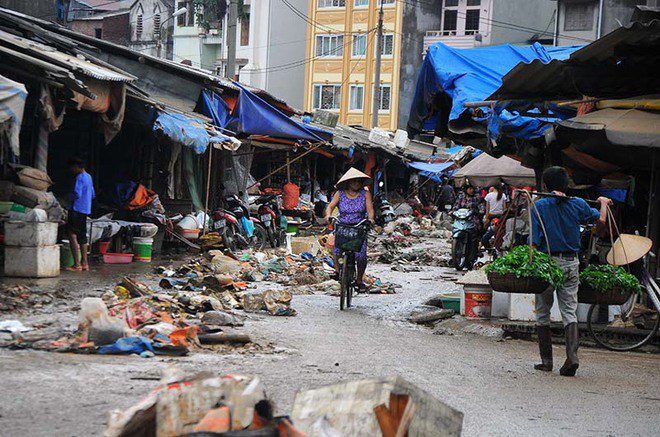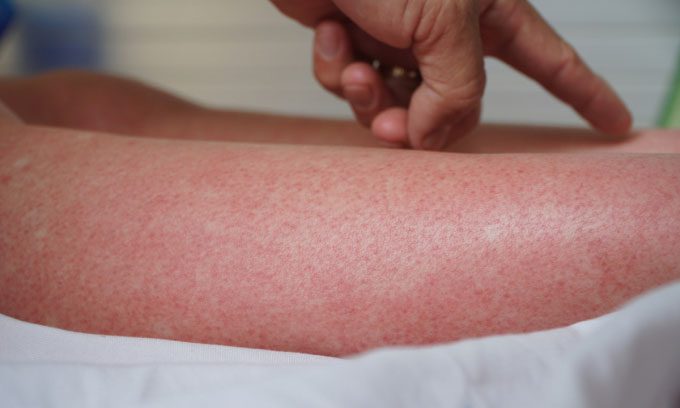The environment is often severely polluted due to wastewater from drainage systems and sanitation facilities dissolving in water. This is a key reason behind the outbreak of certain diseases.
Common Diseases That Can Erupt After Floods
According to preventive health experts, after storms and floods, there are five major groups of diseases that typically arise in residential areas.
The first group includes diseases directly stemming from pathogens in flood-affected areas. These diseases encompass various dermatological conditions such as athlete’s foot, nail fungus; intertrigo (commonly known as “water foot”); rashes; dermatitis…; and conjunctivitis.

After floods, the polluted environment causes many diseases to erupt
Eye Diseases
According to Dr. Hoang Cuong, Head of the Social Work Department at the Central Eye Hospital, conditions such as conjunctivitis and trachoma often occur about 10 days after heavy rains. This is due to the eyes being exposed to dirt and harmful substances; pathogens thrive in moist environments; and the lack of clean water for residents. The high-risk groups for these diseases are children under 15 and adults over 65.
Among these, conjunctivitis caused by adenovirus manifests with symptoms including red eyes, discharge mixed with tears, and a sensation of having a foreign body in the eye. The disease can also cause swelling of the preauricular lymph nodes, conjunctiva, and eyelid margin, along with other symptoms such as photophobia and conjunctival edema…
Trachoma tends to be chronic, leading to persistent discomfort and the formation of large follicles on both the upper and lower eyelids. If treated improperly or inadequately, the inflammatory follicles in the eye can last for months, eventually rupturing and leaving scars on the conjunctiva, resulting in dry eye syndrome. Additionally, complications such as entropion and trichiasis can occur, where the eyelid or eyelashes are misaligned and rub against the eyeball, causing damage. Using contaminated water, dirty towels, shared washbasins, or frequent exposure to flies and mosquitoes can worsen trachoma, leading to corneal ulcers and scarring.
Treatment for conjunctivitis involves using saline solution for eye hygiene, along with short-term use of antibiotic eye drops or antibiotics combined with anti-inflammatory agents. After 7-10 days, the condition should improve and resolve. If symptoms persist beyond this period, especially with photophobia, glare, or blurred vision, it may indicate complications requiring a hospital visit.
Regular eye hygiene and precautions are necessary to prevent reinfection. Using topical or oral antibiotics, the condition should resolve within 4-6 weeks of treatment.
Skin Diseases
The Ministry of Health advises vigilance in preventing skin diseases such as athlete’s foot, hand fungus, folliculitis, ringworm, tinea versicolor, scabies, and boils. This is because rainwater can contain chemicals, toxic gases, and pollutants that easily cause skin conditions. Do not bathe or wash clothes with dirty water. If well water after flooding has not been disinfected, it should be treated with alum or filtered through sand. Avoid wearing damp clothing as it creates an environment for bacteria and fungi to thrive.
Avoid swimming, bathing, or playing in flooded water as it is highly contaminated and can lead to skin diseases or gastrointestinal illnesses. Limit wading into stagnant dirty water; if you do, wash your hands and feet with clean water and dry them thoroughly, especially between the toes.
Respiratory and Digestive Diseases
Common illnesses such as colds, flu, respiratory infections, sore throats, diarrhea caused by E. coli, dysentery, cholera, typhoid, and hepatitis A are more likely to occur during the rainy season due to the humid weather. To prevent these, the Ministry of Health recommends keeping the body warm and minimizing contact with individuals suffering from flu or respiratory infections.
Older adults, young children, and those with chronic illnesses are at higher risk of infection due to poor immunity. This group should ensure they receive adequate nutrition, especially vitamins, proteins, sugars, and fats. If symptoms such as vomiting, nausea, or diarrhea occur, medical attention should be sought.
In addition to ensuring nutrition and boosting immunity, attention should be paid to water treatment, environmental hygiene, and personal cleanliness; eat cooked food and drink boiled water to ensure food safety. Vaccination against diseases is also recommended if available.
Viral hepatitis A and E, as well as conditions like conjunctivitis, bacterial otitis media, and diseases caused by Leptospira, may also occur in flooded areas, albeit less frequently.
Dengue Fever
This group includes diseases caused by vectors that proliferate after floods. These include dengue fever and viral fevers, which are highly contagious and can lead to widespread outbreaks. Notable among these are dengue fever, common viral fever, and malaria.

Petechiae on the legs of a female patient with dengue fever. (Photo: Thu Anh).
Stagnant water sources and humid weather create favorable conditions for mosquitoes and viruses to thrive, causing illness in humans. Therefore, the best prevention method is to eliminate mosquitoes, larvae, and prevent mosquito bites.
To eliminate larvae: introduce guppy fish or flagfish into water containers to consume the larvae. Remove mosquito breeding sites: collect and dispose of waste around the house that can hold rainwater, such as broken bottles, cans, coconut shells, and tires; cover water containers like tanks, jars, and pots tightly; invert containers when not in use. Add salt or pour kerosene into footed bowls (for furniture) and regularly wash flower vases. Spray insecticides around living areas.
To prevent mosquito bites: wear long pants and long-sleeved shirts, especially for children. Sleep under mosquito nets even during the day. Use mosquito repellent sprays, incense, creams, and electric mosquito swatters. Treat mosquito nets, curtains, and bedding with insect repellent chemicals. Ensure patients with dengue fever or malaria sleep under nets to avoid mosquito bites and transmission to others.
To proactively implement measures to prevent disease outbreaks and avoid the spread of illnesses, the Department of Preventive Health, Ministry of Health, has issued recommendations: Citizens should eat cooked food, drink boiled water, ensure food safety, and regularly wash hands with soap.
Conduct thorough cleaning of water tanks, wells, and water storage containers using chemicals like Chloramine B or Aquatabs, or other chemicals recommended by the Ministry of Health to disinfect water for drinking and domestic use.
Additionally, citizens should ensure environmental hygiene by cleaning up as water recedes, organizing the collection, disposal, and burial of animal carcasses. Use lime or other chemicals recommended by the Ministry of Health for burial treatment. Spray insecticides in areas at risk of disease transmission.


















































